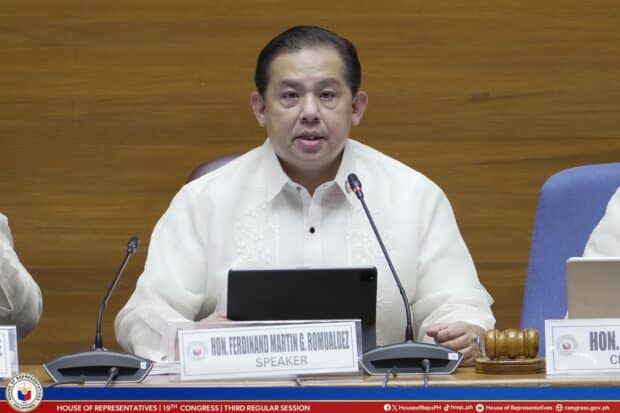Talk to our people, House tells Senate on Akap program

LEGAZPI, Albay — Speaker Martin Romualdez has urged “some senators” opposing the Ayuda sa Kapos ang Kita Program (Akap) to talk to the people so that they can understand its significance.
“Yes, we heard that some people in the Senate do not understand [Akap’s huge impact] because they rarely engage with the people,” he told journalists in Filipino on the sidelines of the Bagong Pilipinas Serbisyo Fair on Thursday.
“That’s why we’re here visiting provinces and attending the Bagong Pilipinas Serbisyo Fair. Over two dozen provinces have been visited … We saw that the people here want this program,” he added.
READ: House insists on ‘ayuda’ Senate wants to defund
Romualdez urged senators to “move around and ask the people what programs they want” so that they would know their sentiments and then asked his audience if they wanted Akap, which means “embrace” in Filipino.
Article continues after this advertisement
“So that I can tell my friends in the Senate that they should stop cutting the budget for Akap, which is really a big help for the people, and it is very popular,” he added.
Article continues after this advertisement
Threat to defund
Romualdez made the remarks after the Senate committee on finance recommended the removal of Akap funds from the proposed 2025 national budget, as stated in the Senate’s committee report on House Bill No. 10800, or the House version of the 2025 General Appropriations Bill.
The chair of the House’s budget committee, Ako Bicol party list Rep. Elizaldy Co, said they would push for the reinstatement of the P39-billion allocation for Akap during the congressional bicameral conference on the budget.
“We can’t allow the administration’s most vital socialized program to disappear,” he said in a statement. “Until these families earn at least P45,000 per person monthly, Akap remains essential.”
Co said Akap provides a one-time P5,000 cash aid to near-poor individuals earning P23,000 or less and it is the government’s most vital amelioration program.
“Our people need Akap now more than ever. We will not allow this essential program to be dismantled without a fight,” he added.
Constructive criticism
Other lawmakers, including Ako Bicol party list Rep. Raul Angelo Bongalon, said they were open to criticism, but it should be constructive.
“I would suggest and I would appreciate it if the criticism would help the government on how to improve the program. Because for me, personally, I visit our region, our province, and I see that the program helps people,” Bongalon said in a separate interview.
“If there is a move to criticize the program, maybe we should criticize in the sense that we should improve the program, not to the point that it will be totally removed, because our people will suffer,” Bongalon added.
“What we’re doing is we’re just giving back the rightful share of these individuals, who are also paying taxes,” he said.
Much controversy has surrounded Akap since House leaders conceptualized it for the 2024 national budget.
Sen. Imee Marcos, Romualdez’s cousin, claimed that the P26.7-billion insertion for Akap has “defunded billions of pesos in pensions for retired military and uniformed personnel as well as government workers.”
But Marcos later said she was unaware whether funds were diverted to Akap.
At the same time, House Senior Deputy Speaker Aurelio Gonzales Jr. said Marcos was one of the senators who signed the page containing the Akap provisions in the 2024 General Appropriations Budget’s committee report.
Deputy Majority Leader and ACT-CIS party list Rep. Erwin Tulfo said he thought of the Akap when he was still secretary of the Department of Social Welfare and Development.
Tulfo said he had observed that middle-class workers are often neglected or left behind in most government aid programs because the government has been focused on implementing measures to help the poor.